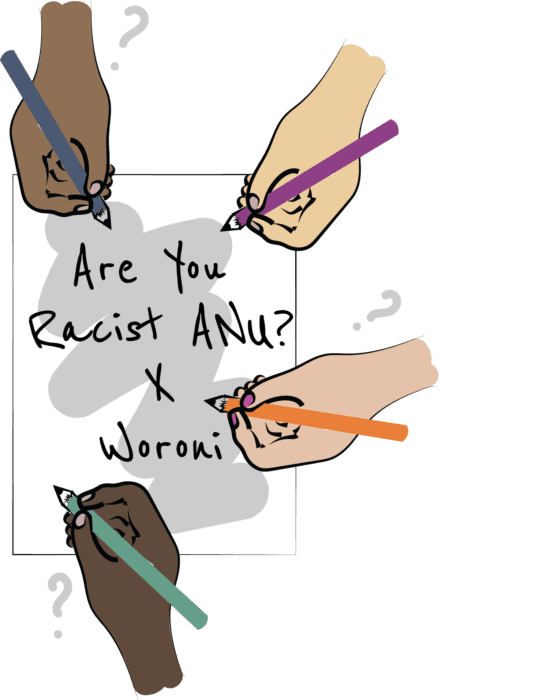This piece is the first of many in the Are You Racist ANU? x Woroni series in association with the ANU BIPOC Department. Want to write for the series? Email anuethnoculturaldept@gmail.com with a pitch or draft.

How aware are you?
The ANU operates on the stolen lands of the Nngunnawal and Ngambri people. Have you ever thought about the fact that you live, study and work on stolen land? A land where sovereignty has never been ceded?
When you go to class and learn through a predominately white Settler gaze, how aware are you that you do so where First Nations complex social and political systems were in place for thousands of years on land beneath your feet?
What are you going to do about it?
As you progress through your degree at the ANU, are you also educating yourself in ways you may be complicit in the oppression of First Nations people today? As you learn to critically analyse and speak up, are you also amplifying the voices of Indigenous people? You are and will always be living on stolen land.
What are you going to do about it? Here’s a great place to start.
Read and listen to Indigenous authors.
Ambelin Kwaymullina is an Aboriginal writer and illustrator from the Palyku people of the Pilbara region. She has written a book, Living on Stolen Land, which is an exploration on how Settlers can respect the Indigenous sovereignties around them and take meaningful action.
This is a short extract from one of Kwaymullina’s poems:
“Settler-colonialism
is a serial violator
of indigenous boundaries
Of lands bodies
hearts
minds….
Listening means learning to hear
the noise of settler-colonialism
inside your head
and all around you
so you can hear past it
to understand our voices
on our own terms”
Think your name would look good in print? Woroni is always open for submissions. Email write@woroni.com.au with a pitch or draft. You can find more info on submitting here.
We acknowledge the Ngunnawal and Ngambri people, who are the Traditional Custodians of the land on which Woroni, Woroni Radio and Woroni TV are created, edited, published, printed and distributed. We pay our respects to Elders past and present. We acknowledge that the name Woroni was taken from the Wadi Wadi Nation without permission, and we are striving to do better for future reconciliation.
